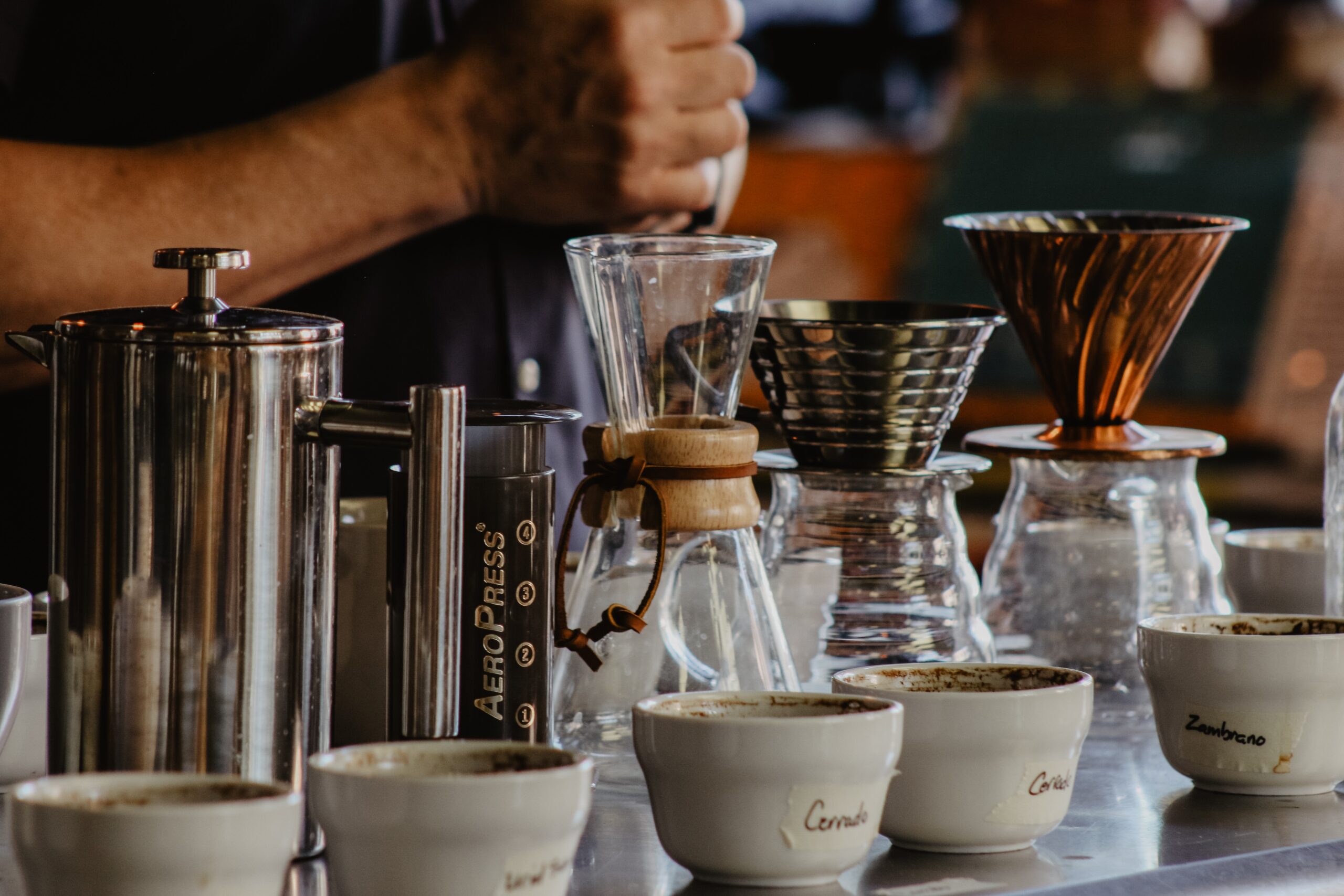
7 Most Eco-Friendly Ways to Make Coffee
French Press is a simple and durable tool that does not require a coffee filter.
AeroPress is a compact and portable tool that requires less water and time to brew.
Cold brew is great for making large batches of coffee with no heat required.
Coffee consumption has skyrocketed in recent years, transforming from a simple drink to a sacred daily ritual for many. But with this surge in popularity comes a dark side: the environmental impact. It may seem insignificant, but the process of producing and brewing coffee can be alarmingly wasteful and energy intensive.
As coffee lovers, it’s crucial that we take action and embrace sustainable brewing methods to enjoy our favorite beverage guilt-free. Here are seven eco-friendly coffee brewing techniques that not only make your cup of joe taste amazing but also help protect the planet.
1. French Press: The Eco-Friendly Brewer
The French Press has captured the hearts of coffee enthusiasts worldwide with its unassuming charm. With its sleek stainless steel and glass design, this humble contraption brews a robust and flavorful cup of coffee that is hard to resist. But what sets the French Press apart is not just its taste, but its eco-friendly nature.
Unlike other brewing methods, the French Press eliminates the need for disposable filters, which are notorious for contributing to the ever-growing waste problem. Instead, all you need is hot water and your favorite ground coffee beans to create a rich and satisfying brew in a matter of minutes. It’s simplicity at its finest.
But the environmental benefits don’t stop there. The French Press allows you to brew multiple cups of coffee in one go, reducing the electricity waste that comes with boiling water multiple times. It’s a small change that can make a big difference in minimizing energy consumption.
Key Eco-Friendly Features:
- Does not require a coffee filter
- Durable and multifunctional
- Can brew multiple cups of coffee at a time
Ideal for: Medium Roast Coffee available at U3 Coffee for you to enjoy!
2. AeroPress: Portable and Sustainable
For the coffee lovers constantly on the move, the AeroPress is an absolute game changer. Its compact and portable design, coupled with its minimalist aesthetic, makes it the ideal companion for any adventure – whether it’s a weekend getaway or a busy day at the office. But what truly sets the Aeropress apart is its commitment to sustainability.
With its innovative mesh filter, the AeroPress revolutionizes the coffee brewing experience by eliminating the need for disposable paper filters. Not only does this reduce unnecessary waste, but it also saves you the hassle of constantly restocking your filter supply. It’s a small change that has a profound impact on the environment.
Key Eco-Friendly Features:
- Does not require a coffee filter
- Less water and brewing time required
- Easy to reuse and clean resulting in minimum water usage
Ideal for: Medium Roast Coffee available at U3 Coffee for you to enjoy!
3. Cold Brew: Energy Efficient Method
Great for the summers, cold brew coffee can be one of the more sustainable ways to make coffee in large batches. The process requires no heat, thus reducing energy consumption, and no daily brewing, as the coffee can be refrigerated. The process of brewing cold brew is simple. Coffee grounds are steeped in water overnight, stored in the fridge, and later strained. The slow extraction caused by cold water leaves the coffee tasting almost sweet and perfect for the summer months.
Key Eco-Friendly Features:
- No heat is required to brew the coffee
- Large batches can be made at a time reducing the energy required for brewing
Ideal for: Medium Roast Coffee available at U3 Coffee for you to enjoy!
4. Pour Over: Great for Reusable Filters
The pour-over method is a great sustainable way to make coffee, especially for light roast coffee beans. The brewing process for pour-over coffee is a little different than the other methods listed here.
For pour-over coffee, a method called percolation is used, where the water runs through the coffee grounds and the flavor is extracted and collected on the other side. The slow brewing process of the pour over can bring out the deep flavor notes often found in single-origin coffee beans. One drawback of this method is that it does require a coffee filter, but this issue can be mitigated with the use of reusable coffee filters.
Key Eco-Friendly Features:
- Only requires electricity to boil water
- Waste can be minimized using reusable filters
Ideal for: Single-Origin Specialty Coffee available at U3 Coffee for you to enjoy!
5. Moka Pot: No Wasteful Filters Needed
For those who enjoy a strong brew and are comfortable with manipulating coffee grinds to create the ideal cup, brewing coffee in a moka pot is a great option. A favorite in Italian households for generations, a moka pot extracts flavors from the coffee bean using hot water and pressure formed in the bottom valve of the pot.
Heating the stainless-steel moka pot with coffee ground and water in the bottom chambers produces rich espresso-like coffee. Since the coffee grounds are placed at a secured bottom valve, there is no need for a coffee filter.
Key Eco-Friendly Features:
- No coffee filters required
- Only requires electricity to boil water
Ideal for: Medium-fine ground coffee available at U3 Coffee for you to enjoy!
6. Turkish Brewing Method: Traditional and Eco-Friendly
Introducing the Turkish brewing method – a sustainable tradition that guarantees a unique coffee experience. Prepare to embark on a flavor-filled journey as you grind coffee beans into a fine powder and boil them in copper pots, no filters needed, making it one of the most eco-friendly ways to enjoy your favorite brew. For the ultimate taste, opt for Arabica beans, known for their superior quality, offering a delightful sweetness with hints of chocolate and nuts.
But here’s the scoop: be prepared for a slightly grainy texture that may not suit everyone’s palate.
So, if you’re up for an adventure and crave an authentic coffee experience, give Turkish brewing a try. It’s sustainability, tradition, and bold flavors all in one cup!
Key Eco-Friendly Features:
- No coffee filters required
- No coffee ground waste
- Only requires electricity to boil water
Ideal for: Arabica Single-Origin Bean Coffee available at U3 Coffee for you to enjoy!
7. Automatic Drip: Batch Brew Sustainability
Don’t miss out on the automatic drip, an essential coffee brewing technique! With its water reservoir, heating element, coffee basket, and carafe, it’s a true coffee-making powerhouse. As hot water flows through the grounds, it extracts all those delicious flavors, oils, and compounds that make your cup of joe irresistible.
Now, here’s the deal: this brewing method does require electricity and filters. But fear not! To reduce environmental impact, you can opt for reusable filters, making it a more eco-friendly choice. Plus, the automatic drip is a crowd-pleaser, perfect for brewing large batches of coffee without the energy loss associated with multiple brewings.
Key Eco-Friendly Features:
- Make large batches of coffee at once
- Disposable filters can be used to make things more environmentally friendly
Ideal for: Medium Roast Coffee available at U3 Coffee for you to enjoy!
Apart from the above-mentioned brewing techniques, some additional steps can further champion the sustainability movement, and make coffee consumption an enjoyable experience without heavy environmental implications.
Some additional tips for sustainably enjoying coffee:
1. Using Reusable Coffee Filter:
Single-use paper filters can cause a significant carbon footprint over time, so using reusable coffee filters reduces waste.
2. Choosing Ethical and Sustainable Coffee Beans:
Use beans that are certified as organic, fair trade, or shade grown. The certifications mean that the coffee is produced in an environmentally friendly and socially responsible manner.
3. Composting Coffee Grounds:
Coffee grounds work great as composting agents, they are rich in nitrogen which is good for fertilizing.
4. Advocating for Sustainability:
Share your knowledge about sustainable coffee brewing with friends and family. Encourage them to adopt eco-friendly practices too.
Sustainability for the Win
Sustainability is a way of life, and everyone can benefit from it. In addition to adopting these eco-friendly brewing techniques, consider supporting sustainable coffee brands that prioritize ethical sourcing, fair trade practices, and environmentally friendly production methods.
Considering how often people drink coffee and the amount of waste the habit can generate, it is a good practice to choose coffee brewing methods that produce less waste and consume less energy. Ultimately, whether you’re a pour-over or a French Press fanatic, an eco-friendly way to make coffee can help you enjoy your next cup while also helping to preserve the environment.
Special cheers to you on selecting your favorite coffee roast with knowledge, while also being environmentally conscious. The perfect aroma coupled with the best flavor awaits you. #coffeemugsunite
Related posts
- Apr 2025 Elevate your coffee-based cocktails! Discover new takes on the espresso martini, Irish coffee, & more classic coffee drinks.
- Feb 2025 Discover the top coffee trends for 2025, from cold coffee innovations to mindful coffee drinking. Explore the latest and future coffee trends in the coffee industry.


